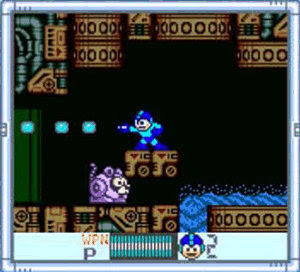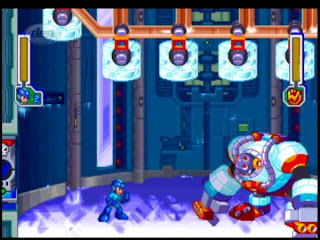After all these years, it still shines above the competition.
Oh, Mega Man Anniversary Collection. I feel like I've known you my entire life, but I've held you for such a short time. It's strange. Every time I pick up my controller to play games with you, it's as if I'm reliving moments from earlier in my life. However, you've managed to make these feelings fresh and, at the same time, keep the memories intact.
What can I say about Mega Man? He's been the star of countless games, almost all of which have been great. To this day he's still putting out new games, branching out into different genres, and allowing supporting characters that are nowhere near his caliber to have their time in the spotlight. So, after years of playing and enjoying Mega Man games, it seems only right that Capcom release a collection of his greatest games. Mega Man Anniversary Collection is, as the name suggests, a collection. Dreams, they do come true! It consists of all eight Mega Man games from the original series, and an additional two arcade games, Mega Man: Power Fighters and Mega Man: The Power Battles. And it sells at $30 as well. It has the makings to be a gem in every PS2 collection it becomes a part of, if not the star attraction. So how does it stack up?
The ports of the games run just as smoothly as the originals. They even seem to run a little better. Things that I remember having split second timing issues with, like Quick Man's stage, no longer seem difficult at all to navigate through. The platforming perfection that Mega Man has managed to find consists of moving from left to right usually, jumping and firing as you go along. As the series progressed, sliding and charge shots were added, but the basic gameplay never suffered in the least. Each of the games starts you at a stage selection screen with Robot Master portraits surrounding a portrait of Mega Man. You choose a Robot Master, navigate through his stage, which is filled with traps, enemies and other things that get in your way. After trekking through the stage, you come to a chamber with the Robot Master. Without hesitation they throw everything they have at you.
Alright, there's a few seconds of hesitation while their life bar fills up, but Mega Man is too nice to start shooting during this situation. If you can manage to defeat the Robot Master, you'll obtain his special power and be returned to the stage selection screen. The special powers are usually useful, or, like Top Spin, seem extremely bad, only to have a hidden use.
You can play all the games in this collection in any order you want, with the exception of the arcade games which need unlocking. Each of the games has no specific order you need to defeat the Robot Masters in, but most of them have a weakness, and it's beneficial to your cause if you use that weakness against them. None of them are so difficult that they can't eventually be defeated by the tried and true Mega Buster, but for someone playing through the game for the first time, it sure helps to wipe out Elec Man in three shots. Also, added into the game if you need a little extra assistance, is the Navi Mode. Navi Mode updates the visuals of the weapon selection menu and life bars, and gives you directional hints at certain points in the game. These directional guidelines are generally pointless, as anyone with half a brain can figure out which direction you should go, but Navi Mode also allows you to play with remixed music in the game.
The earlier games of the series are my favorites. Mega Man 2 and Mega Man 3 are the cream of the crop, although all of them are great. As the series proceeds, the stages seem less detailed, and the Robot Masters get uninspired names, but the core of the game, the incredible fun, remains at all times. Some of the games, such as Mega Man 2, are more difficult than the others, although setting the difficulty to Easy in the options menu seems to rip the difficulty straight from it. Also added to the game is an auto-save feature, so writing down passwords and having to play through the stages all over again because you placed a dot one space too far to the left is no longer needed.
The arcade games take a different approach. Instead of the usual Mega Man style, they put you in a series of boss like battles. These games can be played in two player as well, which just adds to the replay value. Both of the arcade games are easily completed, and the time you spend on them probably won't match up to how much you spend on the core eight titles. They should be treated mainly as an excursion from the normal style of gameplay. What's the best thing about the arcade games? Proto Man. Being a personal favorite of mine, I can't say how much I enjoyed playing as him, even if it was only for a short period of time.
The graphics in the game are perfect, although if you're expecting remakes of the original, you'll be disappointed. The graphics of the games, with the exception of a few instances because of Navi Mode, which can be turned off anyhow, are true to the originals. Pixilated. Sometimes blurry. Perfect. The background designs are amazing in a majority of the titles, and the Robot Master sprites are all unique and interesting. Some of the basic enemies are cute, some evil looking, and some are, well, I'm not sure what the hell some of them are. However, they fit perfectly, just like they should.
The music is perfect twice. The original music in Mega Man is some of the greatest music you'll ever find in a video game. The series has probably inspired more remixes than any other series of games out there, and if another manages to have more, it's not very many more. The techno inspired beats will have you nodding your head or tapping your toes as you play the game, and you may want to start jumping and shooting in rhythm with the beat. I've tried this, and if you need a difficulty increase, shooting only at certain instances can help you with it. However, in Navi Mode, a lot of the tracks are remixed. The remixed music is astonishing. I'm not sure if I like it more than the originals or not, but it's still easily some of the greatest game music ever. Other games have nothing on Shadow Man and Dust Man's themes.
The story of Mega Man, although never really important to the games at all, is, much to my astonishment, actually good. Dr. Light, who built Mega Man and the other robots, had an apprentice. Dr. Wily. Light and Wily used the robots for basic tasks to make life easier for themselves. Selfish doctors. Dr. Wily, apparently enticed by having an evil genius last time, commandeers the Robot Masters and has them attack the world. So, as Mega Man, Dr. Light's last hope, you must shut down the robot masters and take Dr. Wily to Mega Buster Hell. Dr. Wily, though, seems to have a set of skeleton keys that no one can find, because he always escapes after being captured, only to have a group of eight more Robot Masters at his disposal to wreak havoc with. The story grows as you play through the games, but that's the main plot.
With eight games in the collection to start with, and unlockables as well, replayability is pretty much putting holes in the roof. All of the games are short enough that you can pick them up again and play though them often, and the arcade games allow for multiplayer fun.
The game is as difficult as you want it to be. Want an easy time? Turn on Navi Mode, put it on Easy and give yourself three starting lives. More difficult? Dump Navi Mode, change the difficulty to Hard and start with three lives. Certain games, such as the first two, are heads above the others in difficulty to most. The others, however still provide enough challenge that you shouldn't be skipping through the stage while wolfing down a sandwich and a Pepsi.
The differences between the Gamecube version and the Playstation 2 version are small. First off, the Gamecube gets an interview from Mega Man creators, whereas the Playstation 2 gets an episode of the Mega Man cartoon. Neither of these things are worthwhile enough to sway you from one side to the other, and both are readily available on the internet one way or another. Then, we have the fact that the Gamecube doesn't have the remixed music in the game. You can still listen to the unlockable remixes in the secrets section, but the Playstation 2 has remixed music for quite a lot of the stages in Navi Mode. Next, we have loading issues. The Gamecube load times are about half of the Playstation 2 load times, which take no more than fifteen seconds. The loads appear only when you first choose which game you want to play. The only interruption afterwards is the autosave feature. The main issue between the two is the control scheme. The Playstation 2, which is my favorite controller out of the two to begin with, is similar enough to the snes controller, which was similar to the NES controller. More buttons have been added as the years progressed, but the layout makes the games play easily. The Gamecube controller mixed the jump and fire buttons up. Now, at first, I hated this. At first, it also completely sucked. There's nothing that makes you feel worse than falling off a cliff while shooting where no enemies are at. The controls aren't all bad though. The hatred soon died, and the controls soon became second nature. The control issue, nor the other differences, should be enough to sway you from one system to another, but for the people who have both systems, I guess a little incentive is needed wherever it can be obtained.
I can't give this game anything but a 10. If you've ever played a Mega Man game, and you don't own the originals, buy it. You do own the originals? Buy it. Never played Mega Man? Buy it. Reading this review and not even interested in the game? Well, maybe you shouldn't buy it, but that's still discussable. I'm leaning towards buy it. The only possible way I can see someone being disappointed enough to not warrant a $30 purchase is if they've only played the X series and don't like the traditional Mega Man series.
NAME: MEGAMAN ANNIVERSARY COLLECTION
SYSTEM: Play Station 2, XBOX, Game Cube
NAME: MEGAMAN ANNIVERSARY COLLECTION
SYSTEM: Play Station 2, XBOX, Game Cube







No comments:
Post a Comment